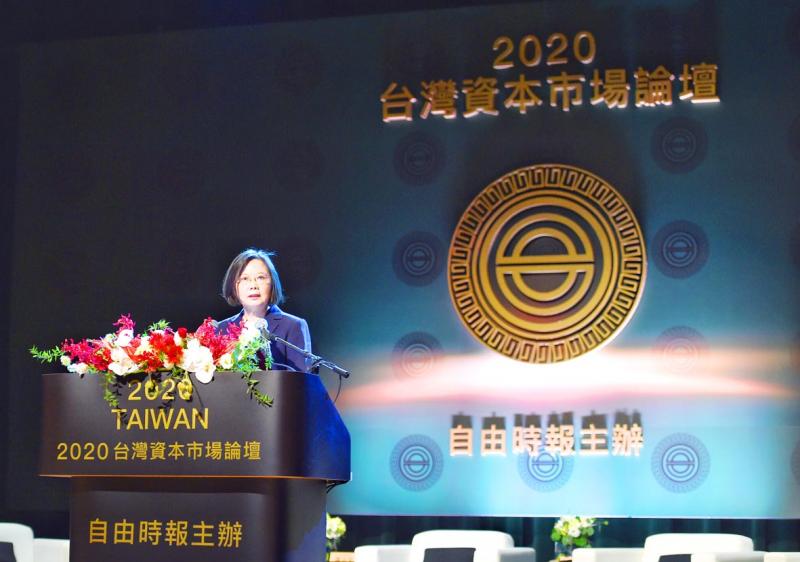Taiwan would liberalize banking and investment rules to establish itself as a regional financial hub, President Tsai Ing-wen (蔡英文) told the Taiwan Capital Market Forum in Taipei yesterday.
Recent world events could be an opening for Taiwan to become an international center for business investments and financial management, Tsai said at the forum, which was organized by the Chinese-language Liberty Times (the sister publication of the Taipei Times).
“We’re facing unknowns in the world right now, including the continuing impact of US-China trade tensions and the reorganization of the global supply chain after COVID-19,” Tsai said. “These bring new challenges and opportunities.”
Tsai said that Taiwan has two major advantages.
“First, our transparent laws and efficient courts are appealing to international businesses. Second, our comprehensive financial institutions,” she said.
In addition, dividend yields are high in Taiwan, transactions are stable and transparent, and compared with surrounding countries, the liquidity of Taiwan’s capital markets is high, Tsai said.
The ratio of foreign investors holding Taiwanese equities is at a historic high, at 41.2 percent as of the end of last year, Tsai said.
There are 1,717 publicly traded companies in Taiwan with a combined value NT$39.84 trillion (US$1.35 trillion), up 106 percent and 331 percent respectively from 2000, she said.
“While the world’s stock markets are all affected by COVID-19, Taiwan’s market hit a 30-year high. It is clear to see we are increasingly favored by foreign investors,” she said.
However, market liberalization would be the key to attract banks and other investment institutions to set up shop in Taiwan amid a government goal to make the nation Asia’s top destination for business financing, Tsai said.
“We are going to make Taiwan the No. 1 center in Asia for capital movement. In the future, we are going to relax rules for international finance institutions to establish offshore banking units [OBU] in Taiwan and make it more convenient to use foreign currencies. With more OBUs in Taiwan, we will be able to strengthen manufacturing development with all that capital,” she said.
“Secondly, we also wish to establish ourselves as a wealth management center,” Tsai said. “This means loosening rules and providing more diversified financial products and services. We can expand the scale of wealth management businesses, and attract more international institutions and capital to Taiwan.”
Tsai said that some businesses have been unable to go public as planned due to profit being hit by the COVID-19 pandemic.
“We’re working with those businesses proactively, loosening requirements and helping them obtain loans to get back on their feet,” she said.
Premier Su Tseng-chang (蘇貞昌) told the forum that Taiwan has taken advantage of the US-China trade dispute by encouraging investment.
“There has been more than NT$1 trillion in investment in Taiwan since last year’s rise in US-China trade tensions,” Su said. “According to last month’s international assessments, Taiwan is the safest investment environment in Asia, and third in the world, after Switzerland and Norway."
Source: Taipei Times - 2020/08/01





















